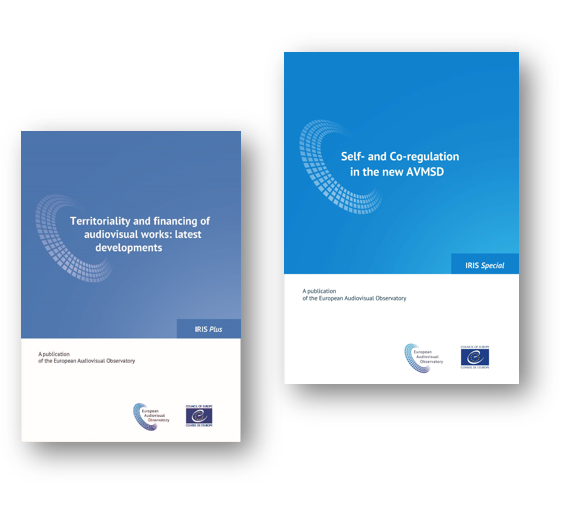IRIS Plus

For each chosen topic, this new publication looks into:
- the economic and technological backdrop
- the international and European regulatory framework
- the national implementation of these provisions
- self- and co-regulation
- case-law
- recent trends.
The former version of the IRIS Plus series (until 2014) was a paid-for publication that featured a combination of a lead article, related reporting and a Zoom section, comprising overview tables, market data or practical information.
- All published issues are available for free in PDF format (see below).
- Print versions for publications prior to 2022, may be purchased from the Council of Europe online shop.
IRIS Plus 2012-3: The Future of State Aid
As every year, May 2012 will see an edition of the Cannes Film Festival along with a new Golden Palm winner. Less in the news but more important for the industry will be the Cannes Film Market, which takes place in parallel. It will allow over 10,000 film industry professionals from over 100...
IRIS Plus 2012-2: The Lifespan for Copyright of Audiovisual Works
Intellectual property rights are one of the tools, if not the tool for rewarding and stimulating creativity. They are attached to many assets which form part of our cultural heritage but which cannot be tagged physically as personal property, as could be, for example, paintings or sculptures....
IRIS Plus 2012-1: Answers to Internet Piracy
Internet piracy is a curse to rightsholders and anyone interested in the viability of the creative industry. The latter includes not only governments and representatives of the au- diovisual sector but also consumers who like to enjoy a rich offer of audiovisual content but who might have to cope...
IRIS Plus 2011-6: Limits to the Use of Personal Data
At the end of September, Facebook announced a plan to extend their service in order to, as it stated, enable users to create a “Life Archive” and thus offer an unlimited number of “friends” all the details and events of their own lives at the click of a mouse. Who would have thought twenty years...
IRIS Plus 2011-5: Why Discuss Network Neutrality?
The freedom to receive and impart information is guaranteed by Article 10 of the Convention for the Protection of Human Rights and Fundamental Freedoms of the Council of Europe. As is the case for exercising other fundamental freedoms, the mere recognition of the freedom of expression does not...
IRIS Plus 2011-4: Who Pays for Private Copying?
Triangular relationships are not only a challenge in human life but also in legal settings. In the case of private copying levies, the three points of the triangle are the creators of works, legally acting copyists and copyright pirates. Their interaction is to some extent, and possibly not suffi...
IRIS Plus 2011-3: Media Literacy
Continuous learning is a well established concept to guarantee that graduation from school or university does not mark the end of studying the subjects related to one’s profession. The more an area of knowledge is apt to change the bigger the need to stay on one’s toes. Training on the job is...
IRIS Plus 2011-2: An Insight into Selected Film Funding Systems
Film aid is not only designed to promote creativity, but it can also be remarkably creative itself in terms of the way it is organised. This is presumably linked to the fact that the definition of common film aid objectives, such as the protection and promotion of cultural diversity and identity...
IRIS Plus 2011-1: A Landmark for Mass Media in Russia
When on 15 June 2010 the Supreme Court of the Russian Federation adopted Resolution No. 16 “On the Judicial Practice Related to the Statute of the Russian Federation ‘On the Mass Media’”, the first international voice applauding this step was that of Dunja Mijatovic, the OSCE Representative on...
IRIS Plus 2010-6: Switchover to the Digital Dividend
Like Siamese twins, the switchover to digital television is inseparable from the spectrum liberated as a result of the process. The twin of the switchover is called digital dividend. If we look closer at these twins, we realize that they are non-identical, as far as at least one important point...
